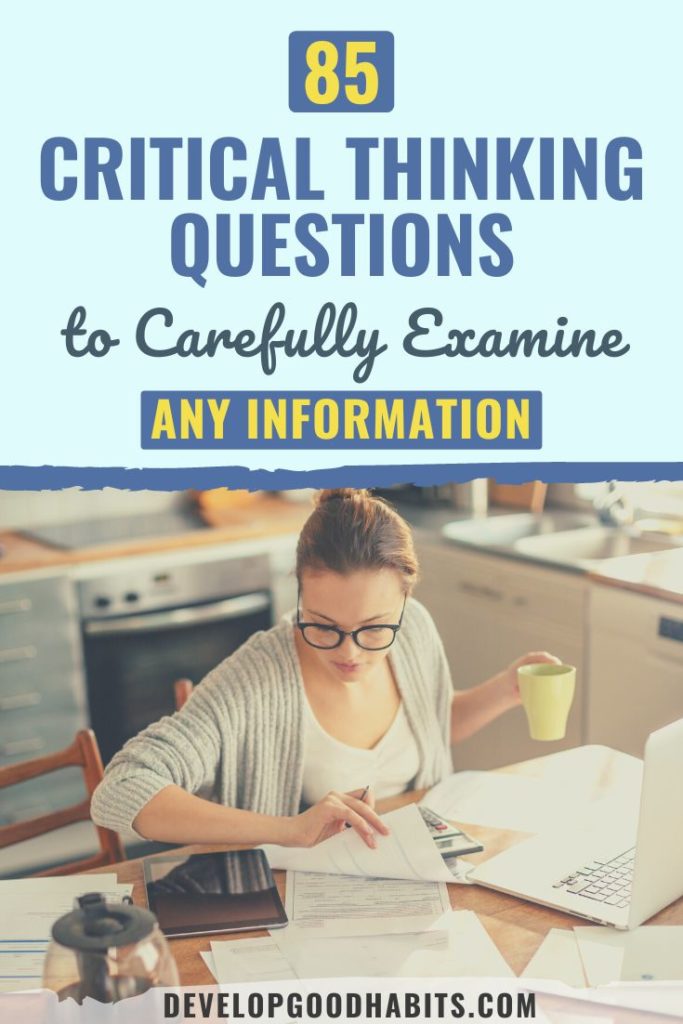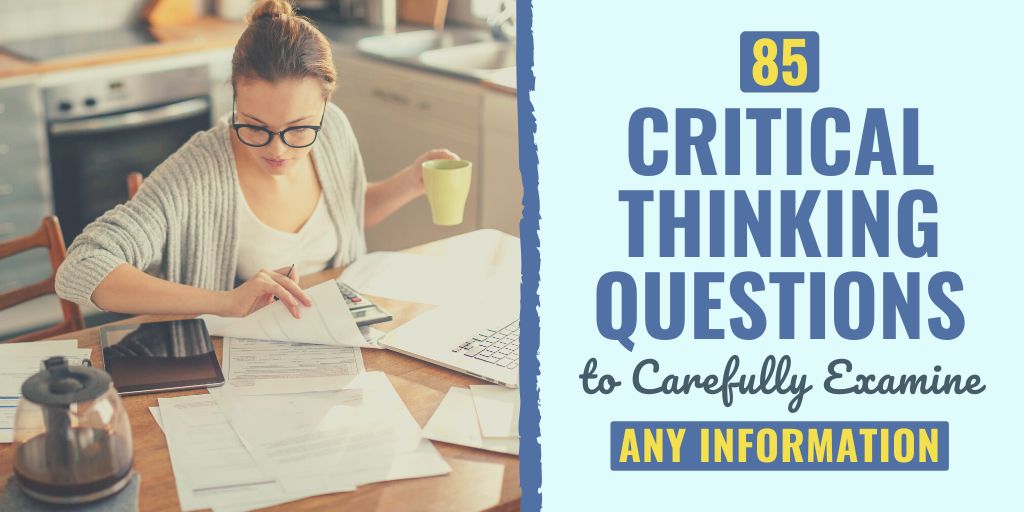There might be affiliate links on this page, which means we get a small commission of anything you buy. As an Amazon Associate we earn from qualifying purchases. Please do your own research before making any online purchase.
The ability to think critically will often determine your success in life.
Let’s face it. Every day, we are bombarded by news, social media updates, and an avalanche of information. If you take all of this at face value, it’s easy to be deceived, misled or ripped off.
That’s why it’s important to develop a mindset that focuses on critical thinking. This is a skill that needs to be developed in the classroom. But it’s also a valuable life skill.
With that in mind, the following post will share 85 critical thinking questions you can use to increase your awareness about different problems by carefully examining available information.
Let’s get started…
What Are Critical Thinking Questions?
Critical thinking questions are inquiries that help you think rationally and clearly by understanding the link between different facts or ideas. These questions create a seemingly endless learning process that lets you critique, evaluate, and develop a depth of knowledge about a given subject. Moreover, you get to reinforce your viewpoints or see things in a new way.
We make decisions every day, whether at work or home. Adopting logical, rational, and practical approaches in addressing various issues requiring critical thinking is essential in decision-making. Therefore, before arriving at a decision, always ask yourself relevant questions and carefully analyze the matter’s pros and cons.
Critical Thinking Questions When in an Argument
When you make an argument using a critical thinking approach, you focus on justified claims that are valid and based on evidence. It helps one establish a strong argument.
- Do I disagree with the other person? Might the person I'm arguing with be misinformed on what they are saying?
- Would I be comfortable saying what I am telling him/her if I was in front of a group of people?
- What would happen if I lose this argument? Is engaging in this argument worth my time and energy? How will I feel if I lose?
- Is there room for ambiguity or misinterpretation? Are we arguing because I didn't make my point explicit? Should I take my time to understand his school of thought?
- Do I need some rest before saying something? Am I arguing because of other reasons other than the issues at hand? Do I need to take some time and cool down?

- Is it more important that I’m right? Am I trying to ask to prove an unnecessary point?
- Is this argument inductive, deductive, or abductive? Is it a weak or strong argument that I need to engage in? Is it compelling or sound?
- Is my opponent sincere? Given that they are wrong, are they willing to admit that they are wrong? Can they depend on available evidence, wherever it leads?
- Are my opponents only trying to shift their burden to me? What is the best way to prove them wrong without making them feel bad?
- Are the people I'm arguing with only interested in winning, or are they trying to pass some information across and help me discover the truth?
Critical Thinking Questions When Reading a Book
When you read a book, you probably ask yourself many “why” questions. Why is this a problem? Why did the character say that? Why is this important? The most challenging part of reading a book is assessing the information you are reading. These questions can help.
- If I learn only two things from this book, what will they be? How will they help me? How will I apply them in my daily life?
- What message are the authors trying to pass across? Are they making suggestions or providing evidence for their arguments?
- Given that almost every book is about solving problems, what is the most prevalent issue that the author is trying to solve?
- What is the author’s writing style? What strategy or master plan does the author employ to convey his/her main ideas throughout the book?
- Do I have background information about the book’s topic? If so, how is what the author is saying different from what I already know?
- What didn’t I understand from the book? Should I re-read the book to understand everything the writer is trying to convey?
- Which sections of the book do I love the most, and why? Generally, do I like this book? Should I look for more books that are written by the same author?
- If I had a chance to meet this book’s author, what questions would I ask him/her? What would I tell the writer about the book? Is it a great book worth recommending to your friends and family members?
- Who are the main characters of the book? If there is only one main character, what overarching goal does the character accomplish?
- In what ways did the protagonist change from the start of the book to the end? What caused the changes? Was the protagonist reckless in some ways? Which ways?
Critical Thinking Questions to Spot a Scam
Asking questions when you feel that a fraud or a scam is being presented to you is a good way to stretch your critical thinking muscles. Are you being emailed or messaged by a stranger? Or maybe there are other red flags you are unsure about. If so, ask these questions.
- Does it seem to be too good to be true? Is this stranger pushy or trying to lure me into making a poor decision?
- When trying out online dating: Is my new “friend” professing strong feelings towards me although we’ve only interacted for a few hours?
- Why is a stranger calling me to ask about my Social Security Number (SSN), personal contact information, or bank details while claiming they are from the bank or a phone company?
- When buying products online, why does the seller ask me to pay for goods using an insecure payment option like Bitcoin or money order?
- Does the email I have received have any spelling or grammatical errors? Is the language used overly formal or informal?
- If I do a quick search about the exact words of the email I received, does Google indicate it's a fraud or scam?
- Why should a stranger manipulate me using obvious questions like “Would you want to be rich or poor?” While they already know the answer?
- Is the email asking me to download an attachment? Or click a link to some insecure website?
- Is the person trying to make me feel selfish or guilty for not sending them money, whether for a donation or buying a product?
- Is the stranger portraying a sense of urgency and using pressure tactics? Are they telling me that their family member needs urgent medical attention?
Critical Thinking Questions About Your Life
It can also help to ask yourself a few critical thinking questions about your life. This way, you can gather basic information and uncover solutions to problems you might not have otherwise thought of.
- Where do I wish to be in a few years, probably two, three, or five years? What short-term and long-term goals should I set?
- What have I achieved so far from the time I set my previous goals? What should I be grateful for?
- Do I have any values that guide me in life? If so, what are these values? Am I always true to these values?
- Am I always worried about what people around me think? Can I act independently without the need to meet social expectations?
- What should people say about me at my funeral? Would they talk about how good I made them feel or how rich and flashy I was?
- If I wasn't afraid of anyone or anything, what would I have done? What if I didn't have any fear in me?
- If today was my last day, what extraordinary thing would I do? Can I do it right now?
- What should I do with the things that matter the most to me?
- What things will make the greatest difference in my future life if I take action now?
- How should I react when I feel unwanted by the people I love the most? Should I tell them?

Critical Thinking Questions for a Debate or Discussion
When you are in the middle of a debate or discussion, you need to know that what you are saying is fact, have evidence to support your claim, and position yourself as an expert in what you are saying. Here are some critical thinking questions to ask when you are in a debate or discussion.
- Is there fairness in this discussion? Is the moderator supporting one side? Do they want to make one side look stupid or wrong?
- What is the aim of this discussion? Is there a major problem that needs to be solved? If so, how can I help solve it?
- Who are the people affected by this discussion? If they were here, what would they say?
- Do my views on this discussion matter? If I raise my point, will I be redundant?
- What am I supposed to learn from this debate, and how can I use what I have learned in my daily life?
- Does the audience seem to be biased towards one side? Are they booing one side? What can I do even if it's our opponents being booed?
- Who are the discussion panel members? What views have they held about this kind of discussion or any other related discussions in the past?
- How can I make my point without being ambiguous? Before I speak, should I take down some notes to avoid any confusion during my speech?
- Am I ready to apologize if I make a mistake during the discussion? If so, what are the limits?
- What information does my team, or I need before this discussion?
Critical Thinking Questions About Lying
Admitting when you are wrong, choosing not to cheat, and sharing constructive feedback are all ways to show your honesty. Here are some critical thinking skills to ask regarding lying.
- Will the lie hurt those I am telling, or will it help them? What if being honest might cause my friend unnecessary pain?
- Should I be the one telling this person a lie, or I let someone else do it?
- Will I be the one hurt if I tell this lie? Will my friend feel I am a betrayer? Will it affect our friendship?
- Do they answer my questions in detail, or are they always trying to ignore and dodge the main problem?
- What if I ask these people the same question using different terms and wording? Will they give me the same response?
- Did the tone of my friend suddenly change after I asked him/her this question? Do they sound louder, faster, or slower compared to how they usually speak?
- Does this person have something to gain by lying to me? What is their motive?
- Does this person take a sudden pause or hesitate more than usual when responding to my question?
- When I look at these people's faces, do their facial expressions match what they say?
- Should I believe this person or not? What are my intuitions? Does it look like they are telling the truth?
- Do they blink like other days when I ask them questions? Are they always trying to avoid direct eye contact?
- Why do they seem uncomfortable when it’s just a normal conversation?
Critical Thinking Questions When Presented With a Claim
Critical thinking is much more than just evaluating whether a claim is true or not. It also means a critical thinker reflects on what follows from true claims.
- What does this claim mean, and what are its implications? What if it's a false claim?
- Which of my morals, values, or beliefs do I have to give up to accept this claim?
- Do professionals in this field agree or disagree with the claim that has been made?
- Do they have evidence to back their claim? Which is the most robust evidence to support the claim?
- What argument can I come up with to refute this claim? Or what is the best view that can support this claim?
- Who is the primary source of the claim being made? Is the basis of the claim reliable?
- Is it a claim, or it's just an opinion?
- Is the claim likely to be 100% false, true, or partially true?
- Am I allowed to refute the claim and table my evidence, or is it one-sided?
Critical Thinking Interview Questions
Critical thinking skills are valuable in any industry or field and for almost all roles. During a job interview, you will be asked questions so the potential employer can assess your skills and see how you use logic. Your critical thinking ability is just one vital part that can play into your professional development.
- Is there a time you had to convince someone to use an alternate approach to solve a problem?
- Have you ever had to make a difficult decision quickly?
- How would you handle a situation where your supervisor handled something wrong or made a mistake?
- What is one of the most difficult decisions you have ever had to make at work?
- How would you solve a disagreement between coworkers when approaching a project?
- Can you describe a time when you anticipated a problem ahead of time and took the appropriate steps to stop the problem from becoming an issue?
- If you discover a cheaper way to do something or a better solution to a problem and try to explain it to your supervisor, but they don’t understand, what do you do?
Critical Thinking Questions for Kids
We can’t leave the kids out either. Critical thinking questions for kids get them thinking and talking. It also allows a parent to get to know their child better.
- How many grains of sand do you think are on the beach?
- What would happen if it stopped raining?
- Do you think there is life on other planets?
- Should children be able to set their own bedtimes?
- How would you describe what a tree looks like without saying green or leaves?
- Can you name five different emotions?
- Can you talk for five minutes without uttering “um?”
What Are the Basic Principles of Critical Thinking?
Your critical thinking skills involve gathering complete information, understanding and defining terms, questioning the methods by which we get facts, questioning the conclusions, and looking for hidden assumptions and biases.
Additionally, we can’t expect to find all of the answers, and we need to take the time to examine the big picture of it all.
Here are the basic principles:
What Are Good Analysis Questions?
Analysis is a part of critical thinking that allows you to examine something carefully. Someone with analytical skills can examine the information presented, understand what that information means, and then properly explain that information to others. Analysis in critical thinking provides more clarity on the information you process.
When analyzing, you may ask yourself, “how do I know this,” how would I solve this problem,” and “why does it matter?”
Why Is Critical Thinking an Important Skill?
Critical thinking skills allow you to express thoughts, ideas, and beliefs in a better way. It also leads to improved communication while allowing others to understand you better. Critical thinking fosters creativity and encourages out-of-the-box thinking. This is a skill that can be applied to many different areas of your life.
For example, knowing the answers to critical thinking questions for a job interview will better prepare you for the interview. Many employers, during questioning, are likely to ask you critical thinking questions to assess if you have the ability to evaluate information effectively so you can make more informed decisions.
Final Thoughts on Critical Thinking Questions
Although it's common to get torn between making two or more choices, nobody wants to make the wrong decision. The only thing you can do to avoid this is use critical thinking questions to examine your situation. The answers to these questions will help you make informed decisions and help you comprehend crucial matters in your life.
Want to learn more about critical thinking and decision-making using a real-life example? Here is how Jeff Bezos uses critical thinking to make some of the most challenging life decisions.
Finally, if you want to ask better questions, then watch this short, 20-minute course to learn how to have a great conversation with virtually anyone.


